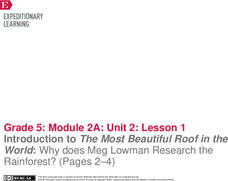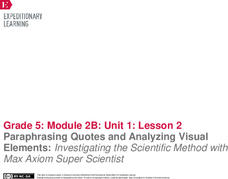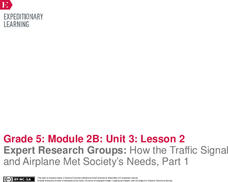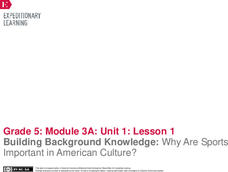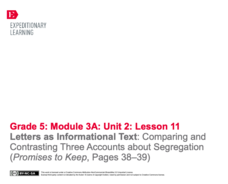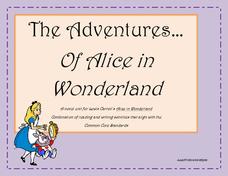EngageNY
Building Background Knowledge: Close Reading Part 2 of “Shrouded in Myth”
That was a good talk. Scholars learn about how to conduct a good discussion. They use chart paper and markers to record and discuss expectations for members when working in a group. They then take a look at vocabulary in Shrouded in...
EngageNY
Meeting the Main Character: Launching The Lightning Thief (Chapter 1)
Three is company! Scholars work in groups of three to discuss quotes from the first pages of The Lightning Thief. Each group records their thinking on the paper of the quotes before talking about Percy's character using the Making...
EngageNY
Using Details to Determine Theme: The Myth of Cronus
There's nothing like a good theme! After reviewing the story of Cronus, learners participate in a mini instructional activity about theme by pulling papers from an envelope and identifying the writing on it as either a topic or a theme....
EngageNY
Qualities of a Strong Literary Essay
Put it all into words. Scholars work toward writing an argumentative essay. They begin by examining and marking strong words in Are We Medieval? A Literary Argument Essay Prompt. Learners then use Qualities of a Strong Literary Argument...
EngageNY
Launching Modern Voices: Concrete Poetry
Challenges are different for today's kids. Learners begin to think about their own challenges by examining the adversities faced by children in medieval villages. They complete a graphic organizer as they watch the video Hackschooling...
EngageNY
Narratives as Theater: Esperanza Rising, from Novel to Script
Calling all thespians! Working in small groups, pupils practice reading and performing a readers theater script for the novel Esperanza Rising. Next, they read aloud passages from the novel and use an anchor chart to compare the script...
EngageNY
Science Talk
Talk like a scientist. Pupils engage in a science talk about rainforests, using a note-catcher worksheet to record important points. Next, they work in triads to synthesize their ideas about the rainforest, adding notes to a KWL anchor...
EngageNY
Building Background Knowledge: Examining the Unique Living Things of the Rainforests and the Scientists Who Study Them
Gorillas, tigers, and tree frogs ... welcome to the rainforest! Scholars complete a KWL chart to determine what they already know—and what they want to find out—about the rainforest. Next, they participate in a gallery walk, viewing...
EngageNY
Introduction to The Most Beautiful Roof in the World: Why does Meg Lowman Research the Rainforest? (Pages 2–4)
Let's go for a walk. Scholars take a book walk through the text The Most Beautiful Roof in the World and create an anchor chart to list the features of informational text. They then take a close look into the character Meg Lowman by...
EngageNY
Close Reading: Blue Creek, a Rainforest in Belize (Page 12)
Peace and quiet. After reading page 12 of The Most Beautiful Roof in the World, scholars participate in a silent conversation with a chalk talk activity. They take turns describing how the rainforest is diverse by writing on chart paper....
EngageNY
Analyzing How Rainforest Scientists Communicate Their Research (Pages 39–42)
How do you say that? Learners read pages 39-42 of The Most Beautiful
Roof in the World to analyze how the rainforest scientists communicate their research. They record their ideas in a KWL chart and then work in groups to explain...
EngageNY
Paraphrasing Quotes and Analyzing Visual Elements: Investigating the Scientific Method with Max Axiom Super Scientist
Pay close attention. Learners discuss the things close readers do and record them in a chart. They then silently reading section 1 of Investigating the Scientific Method wit Max Axiom Super Scientist and write the gist of the text in...
EngageNY
Using Quotes and Opinion Writing: Ingenious Inventions by Women
Scholars complete multiple reads of Ingenious Inventions by Women: The Windshield Wiper and Paper Bag machine to determine gist, use quotes, define words, and form an opinion about the importance of the interventions. Learners work in...
EngageNY
Expert Research Groups: How the Traffic Signal and Airplane Met Society’s Needs, Part 1
Where would society be without the TV? Working together, scholars complete an anchor chart about the invention of the television. Additionally, pupils complete vocabulary cards for key terms from the unit and organize them on a metal ring.
EngageNY
Building Background Knowledge: Why Are Sports Important in American Culture?
What makes sports so special to many Americans? Scholars ponder the question as they participate in a gallery walk, immersing themselves in images and texts about sports. Pupils also complete a vocabulary strategies anchor chart to...
EngageNY
Identifying Author’s Opinion and Evidence: The Value of Sports in People’s Lives, Part I
Just like instant replay, it's time to take a closer look! Pupils work together to add ideas to a Close Readers Do These Things anchor chart. They then put their knowledge to the test as they read an informational article about the...
EngageNY
Comparing Multiple Accounts of the Same Topic: The Story of Bus Desegregation (Promises to Keep, Page 21)
It's all connected. Learners read event details in Promises to Keep to determine the connection between the bus boycott and Jackie Robinson. They watch a video and read Rules for Riding Desegregated Buses to discover even more details to...
EngageNY
Reading to Determine Important Relationships between People and Events: The Importance of the 1936 Olympics for African Americans (Promises to Keep, Pages 16–19)
Scholars look at cause-and-effect relationships while doing a close read of the 1936 Olympics on pages 16-19 of Promises to Keep. They complete a cause-and-effect note catcher and add their ideas to an anchor chart. Readers then work...
EngageNY
Determining Author’s Opinions, Reasons, and Evidence: Signs of Hope and Progress for African Americans in the 1920s (Promises to Keep, Pages 14–15)
Caption this. Readers look at the text features in Promises to Keep and pay special attention to the photographs and captions before adding to the Features of Informational Text anchor chart. Learners then answer questions about life in...
EngageNY
Letters as Informational Text: Comparing and Contrasting Three Accounts about Segregation (Promises to Keep, Pages 38–39)
Letters ... a lost art or good resource? Scholars add letter writing to their informational text chart and describe the features of a letter. They then look at page 38 in Promises to Keep and complete a Perspectives Venn diagram. To...
EngageNY
Writing an Introduction and Body Paragraph That Support an Opinion: Jackie Robinson’s Role in the Civil Rights Movement
It is all in the introduction. Class members first learn to write an introduction paragraph and body paragraphs to support it. They then work to create a Criteria for Writing Opinion Essays anchor chart.
EngageNY
Close Reading: “Dog Sleds” and “Kayak”
Visualize it! Scholars read pages 12–15 of The Inuit Thought of It and create a visual gist of the text. They then do a close read of the text and create a natural environment anchor chart before answering text-dependent questions.
Stillwater Central School District
The Adventures… Of Alice in Wonderland
Go down the rabbit hole with a thorough novel unit for Lewis Carroll's Alice in Wonderland. With a cause and effect chart, K-W-L organizer, and reading comprehension questions, the resource is a great addition to your summer assignments...
Scholastic
Mixed Bags: Fiction and Nonfiction
Using a bag with one fiction and non-fiction book of similar topics, partners work together to find the differences and similarities of each story. They record their obervances in a T-chart.










